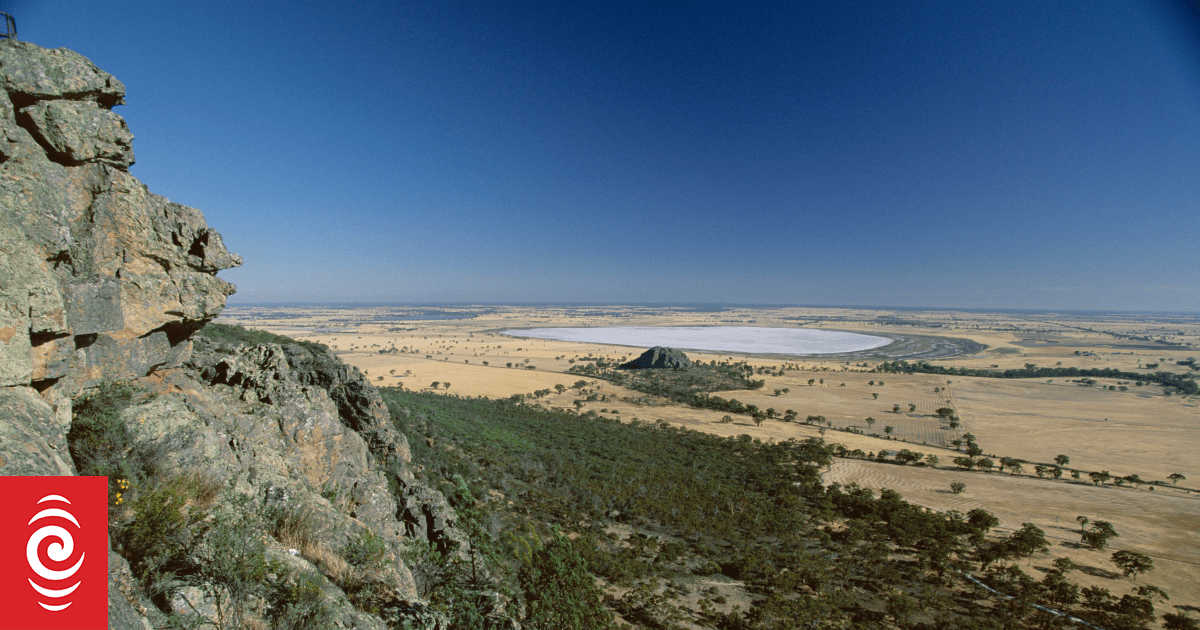
A view from Mount Arapiles in Victoria. File pic
Photo: ROB FRANCIS / AFP
Recreational climbers were the first to respond after a 69-year-old rock climber died in a fall at Mount Arapiles in western Victoria, Australia.
The New Zealand woman fell as she scaled the final section of a climb called Eskimo Nell.
Mount Arapiles is a renowned rock climbing destination attracting outdoor climbers from across the world.
Emergency services were called around 3:30pm on Tuesday afternoon to Centenary Park Access Road.
Climbing veteran Zorba Parer heard a cry and went to help.
He free climbed 80 metres without a harness and rope and was the first person to reach the woman, while two other climbers followed him.
Another two climbers went to the top to drop a rappel line and abseiled down 30 metres.
“I could see a body wedged in the crack which didn’t look good – it looked like she had fallen directly on the ledge,” Parer said.
“I scrambled up and checked on her. There was no pulse.”

Zorba Parer free climbed without a rope to reach the woman.
Photo: ABC Wimmera / Julia Bergin
Parer said it took him 20 minutes to reach the deceased climber.
He then brought the climber’s belay partner up, and together with the four other climbers, commenced CPR on the woman until paramedics arrived.
He estimated the helicopter arrived about 20 minutes after that.
While Parer was not able to help the climber who died, he was glad to assist her belayer and help emergency services find her.
“I didn’t know the lady … I think it’s always easier than if you have a personal connection with someone … I certainly won’t forget her now,” he said.
A report will be prepared for the coroner.
‘Above average’ year for rescues
Country Fire Authority (CFA) assistant chief fire officer Mark Gunning confirmed that by the time paramedics were able to get to the climber she had died.
The CFA was part of a full emergency response led by Victoria police, including search and rescue from Melbourne, SES, Rescue Fire Victoria and Ambulance Victoria.
Victoria’s SES said that in the past 12 months, they had assisted emergency services in 11 rescues at Mount Arapiles.
The last death from a fall at Mount Arapiles was in 2014.
Acting operations manager for the SES in the Wimmera Jordan Bush said they saw high-angle rescues quite regularly, which intensified from October to March when the weather was warmer.
“This year has been probably an above average year in terms of how busy our high-angle rescue [team] has been,” he said.
Climbers reminded to check gear
Bush praised the capabilities of the local units, who were ready to go 24/7 with all their equipment.
“We’re pretty fortunate that in both SES and CFA, in the Natimuk and Horsham areas particularly … we’ve got a lot members that are recreational rock climbers or abseilers, just generally outdoorsy people,” he said.
Bush said it was a timely reminder for climbers and abseilers to check their equipment.
“It’s a great idea to make regular checks of gear a habit, and ensure any equipment you might use is actually fit for the task you’re about to use it for,” he said.
-ABC

